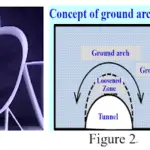When you own your home, you try as hard as possible to keep it nice. As the years go by, you may want to do renovations on it, add an extension, or make other changes to it. If you share a wall with a neighbour, they might want to do the same.
While there is nothing wrong with improving your home, you are not supposed to do anything that interferes with the integrity of the wall you share with your neighbour. The Party Wall Act 1996 outlines what you can or can’t do during any construction work on your property.

What is a Party wall?
A party wall is a dividing wall between two adjacent homes, where both property owners on each side hold a legal interest. This is the wall that separates your home from your neighbour’s.
The significance of a party wall lies in its shared ownership, as both neighbours have rights and responsibilities concerning its maintenance and agreeing to any alterations. Without the consent of their neighbour, the owner on one side would be considered trespassing if they carried out any construction or modifications to the party wall.
So, what is the Party Wall Act?
The Party Wall Act is a crucial legal framework in England and Wales. It is strategically designed to prevent and manage construction-related disputes between neighbouring property owners. Its primary purpose is to protect the structural integrity of shared walls and adjacent properties by preventing building work that could pose risks or compromise stability.
The Act requires property owners to notify their adjoining neighbours before construction. They should provide essential details about the proposed work. This early communication fosters cooperation and allows the neighbours to assess potential impacts on their properties, paving the way for amicable agreements.
It emphasises that communication and dispute resolution is vital. If disagreements arise, the Party Wall Act outlines a straightforward procedure for appointing surveyors to impartially assess the construction plans and mediate between the parties involved.
Build Extensions and the Party Wall Act
When embarking on a building extension project, the Party Wall Act holds particular relevance, especially concerning excavating foundations. You should be careful if this activity occurs near the neighbouring building or garden. This aspect of the Act can become a legal minefield, necessitating careful consideration and adherence to the regulations.
The Party Wall Act 1996 applies when the excavation for the new foundations falls within a critical distance of 3 meters from the adjoining property. If the trench you want to dig exceeds that of the existing foundation, you must comply with the law.
Like Us on Facebook!
Unfortunately, older properties tend to have relatively shallow footings. This makes it highly likely that the foundations for your extension will be considerably more profound. Such a discrepancy means that your project could impact the integrity and stability of your neighbour’s property.
Subscribe Us on YouTube!
To ensure compliance and alleviate any uncertainties, it is advisable to consult the records that detail foundation depths. Alternatively, you could seek an expert opinion from a building control surveyor and avoid trouble. Remember, taking the necessary precautionary steps fosters a smoother building experience.









